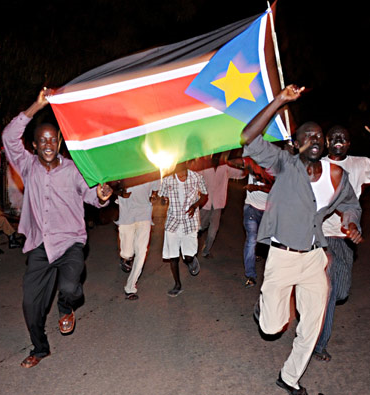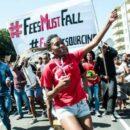South Sudan: newborn state in a nasty zone – By Richard Dowden

Looking back on my recent trip to Uganda and Sudan it struck that while Kampala throbs with energy and activity, its inhabitants are discontented. In Juba in contrast there is very little economic activity but everyone you meet is blissfully happy.
Although I had been in southern Sudan many times during the civil war, I tried to come to the new state of South Sudan with an open mind and a simple question. Having become independent some 50 years after most African states, has South Sudan learned from the mistakes of other African countries?
Ask anyone if they are happy to be an independent country and you are rewarded with a huge smile and an overwhelming YES! It is not just the end of an almost 50 year long civil war. It is a feeling of real freedom from oppression and fear. Not one person I spoke to, not those who collaborated with Khartoum, not those who have now been forced to leave their homes and possessions in the north and trek to an uncertain future in the south, had any doubts that southern independence was a good thing. The referendum result was nearly 99% in favour. It is believable. The commonest phrases you hear are: “We suffered so much – the northerners are cruel people – they did not respect us. Now we are happy.”
The great irony is that the Sudan People’s Liberation Movement (SPLM) had fought since 1983 not for independence, but for a united, democratic, secular Sudan. That at least was the official position. But after its founder, John Garang, was killed in a helicopter crash in 2005, his friends said that independence was always his ultimate aim.
The question is now how well has the movement prepared for it? There is a flag, a presidential palace, an international airport and a massive memorial to Garang. But they have not yet agreed on the new country’s name. The “Republic of South Sudan” is temporary. There is – as in most African countries – huge potential: oil, water, millions of hectares of fertile land and forests and rich mineral deposits. Independence Day on July 9th was the mother of all parties lasting several days. Recovering from the hangover, people are beginning to realise that this infant state should be in emergency post-natal care. Decisions taken now are critical to the stability, indeed the very survival of the country. But there is no national development plan. No agreement has been reached on how to share the revenue of 500,000 barrels of oil per day with the north. Most of it is under the south but the pipeline to the coast goes north so Khartoum gets the cheques. It has not paid the south anything for two months. There is no agreement on the border or the status or the disputed Abyei region.
The SPLA is convinced that once agreements are reached with Khartoum, its former imperial power will no longer have an interest in destabilizing it. I am not so sure. A successful South Sudan would be a threat to it. Its very success in achieving independence might encourage Darfur and other parts of Sudan to rise up or break away. A strong south may back the rebellions in Darfur and the Nuba mountains, the latter a solidly SPLM area which ended up the wrong side of the border but has gone on fighting. So it is better from Khartoum’s point of view to keep South Sudan weak and dependent. That is easy. Juba is 900 miles from the nearest port, Mombasa, with a single lane potholed road for much of the way. There is no railway and the oil pipeline runs through the north and the cost of building one southwards is probably prohibitive. Not even the Chinese are interested.
Glance around South Sudan’s other borders. To the east, the poorest and most disrupted part of Ethiopia. To the west lie Congo and the Central African Republic. But the borderlands are unplaced and infested with the deadly remnants of Uganda’s rebel movement, the Lord’s Resistance Army. No hard top road links Juba to these borders. South east lies Kenya but with no road to that border either, and south is Uganda, an ally and the main link to the outside world but with its own hot politics. This is not a nice neighbourhood for an infant to grow up in.
The lack of clear strategy may be explained by three post-natal emergency crises each of them horrendously complicated. Firstly the largest ever mass movement of people in peacetime, the vindictive expulsion of all southerners from the north. Some four million southerners lived in the north in 2005 when the Comprehensive Peace Agreement was signed. Since then an estimated three million have headed south but another million are still to come. Thousands are making their way down the Nile from Khartoum to Renk in packed buses, then squeezed onto cramped barges for the three day journey to Juba. The UNDP is trying to hire more barges that will take 1000 people at a time. While some had jobs and homes in the north, many of them have survived in appalling conditions in camps of plastic and cardboard around Khartoum. Forced to sell their few possessions for a pittance, they carry what they can onto the boats. At Juba the International Organisation for Migration tries to provide shelter and arrange transport onwards to their original homes.
Secondly, local wars have broken out in several parts of the country. At Pieri in Jonglei state some 600 men, women and children were slaughtered in a revenge raid on Nuer people by Murle fighters. Other murderous attacks are funded by the Khartoum government to weaken and destabilize the new country. Warlords also create havoc as a strategy to force the government to pay them off or give them positions in the new administration. This may encourage other greedy barons to do the same. Elsewhere local groups are indulging in old-fashioned tit-for-tat cattle raiding. Previously these would have resulted in a few deaths and wounds from spears and swords. These days scores die in gun battles.
Thirdly when the new government was finally announced on August 25th, the most prominent leaders of two of the three most powerful ethnic groups, the Nuer and the Shilluk, were not included. Respectively Riek Machar and Lam Akol, both had rebelled against the SPLA leadership during the war and then switched sides and took posts in the Khartoum government. Machar is Vice President but has no portfolio and is not in cabinet. Unsurprisingly the Dinka, who controlled the SPLA and now the government, do not trust them but cannot find sufficiently influential new leaders to bring into government. The danger is that underrepresentation in cabinet may alienate these very important groups still further.
The SPLM is ill-prepared for government. An air of lackadaisical ease hangs in ministry offices and among Juba’s chattering classes. You would not think that South Sudan’s independence was agreed six years ago. A sense of urgency there is not. Is it that they never believed this day would dawn and so they think they are still dreaming? The contrast with the frenetic activity at the UN offices could not be greater.
When President Salva Kiir Mayardit announced the new government this impression was confirmed. It was largely a list of loyal and long-serving SPLM members receiving their rewards. The US ambassador is reported to have handed him a list of cabinet members with details of their surprisingly large bank accounts. The president chose to ignore it. In the fraught transition to independence, loyalty was understandably the chief virtue. The President has always been good at keeping the peace in his fractious party but what he needs now are dynamic managers to deliver the fruits of independence. Instead he chose the old faithful, more suitable to an upper chamber than an effective cabinet. Those who had been dropped were leading members of the SPLM who had started to become vocal about the government’s lack of delivery to the people. And parliament is unlikely to provide the impetus. It will retain its interim members, including appointees as well as members elected under the old regime, until an election four years hence. Two days before independence, leaders of the tiny but main opposition party in parliament were arrested and badly beaten up by soldiers.
Perhaps the most striking insight into the world’s newest state came when I did what most people in South Sudan, indeed most people in Africa, have to do: walk. That was when I realized that South Sudan’s rulers have learned nothing from the mistakes made in the rest of Africa over the past 50 years. Juba has some smart new four lane roads. There is little traffic so you can get anywhere by car in ten minutes, though increasingly you have to pull over while a minister’s convoy of fat, dark windowed four by fours roars by, sirens wailing and lights flashing. When this happens the walkers have to jump into the muddy ditch. These smart new roads have no pavements. They are built for the cars of the elite, not for the people.
Richard Dowden is Director of the Royal African Society, series editor of African Arguments, and author of Africa: altered states, ordinary miracles








Riek Machar, listed in the article as having been left out of the new government, is actually the current vice-president of South Sudan, which is a rather strange omission by the author.
See the bottom of this page: http://www.goss-online.org/magnoliaPublic/en/president.html
Good article. Riek is still VP though right?
Thanks for the comments – a clarification has been added above (as below):
‘Machar is Vice President but has no portfolio and is not in cabinet.’
Thanks Dowden, I would love your writings to be part of a regular publication here either in Thecitizen or Thejubapost for the benefit of those who might not have the time to access it.
Secondly, the only saviour that we have here in South Sudan is partriotism, hope and patience otherwise what the government officials are doing matched against the needs of the civil population leaves a gap of a century for us to be able to attain the ingredients of statehood; the condition of the civil population in the rural areas, being served by the constitutional post holders who are driven in the latest V8s is a nightmare.
We posted a piece today that is a useful addition to the Sudan story. Dr. Hamid Ali from the American University of Cairo found that the Government of Sudan spent US$35.11 billion between 2003-2009 on the war effort in Darfur. Huge sums.